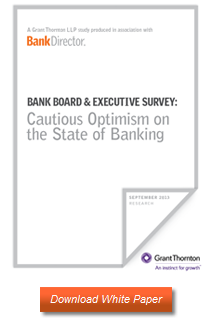
2013 Bank Board & Executive Survey: Rising Optimism on Banking
Brought to you by Grant Thornton LLP

 In June of this year, Bank Director asked CEOs, senior executives, chairmen and audit committee members of the nation’s banks for their insights on the current state of the banking industry–and their thoughts on the future. The 2013 Bank Board & Executive Survey was sponsored by Grant Thornton LLP.
In June of this year, Bank Director asked CEOs, senior executives, chairmen and audit committee members of the nation’s banks for their insights on the current state of the banking industry–and their thoughts on the future. The 2013 Bank Board & Executive Survey was sponsored by Grant Thornton LLP.
Bank leaders hold a rosier view of economic affairs for the coming year–although they remain wary of the impact of economic events on their institutions. Lending will continue to drive plans for growth, while banks strive for efficiencies that improve the bottom line in a continued low interest rate environment. Technology is also top of mind for respondents, who reveal what retail innovations they value and what cyber security risks keep them up at night.
With fewer than half of the rules within the Dodd-Frank Act finalized, it’s not surprising that survey respondents remain deeply concerned about the implementation of regulations coming out of Washington. Nichole Jordan, national banking and securities sector leader for Grant Thornton, says that bankers see that things are getting better, but remain wary of competitive and regulatory challenges. “There’s still a great deal of uncertainty as a result of the evolving regulatory environment,” she says. “Banks are increasingly concerned that they will be unable to meet onerous compliance requirements and still be profitable.”
Key Findings
- Forty-three percent of executives and directors surveyed expect the U.S. economy to improve in the next six months, a rise of 30 percentage points since last year’s survey.
- Margin compression was the top concern for 89 percent of respondents, followed by the regulatory compliance burden for 86 percent of respondents and loan competition for 78 percent.
- When asked about specific regulatory issues, respondents indicate greater concern about implementation of the Dodd-Frank Act and the regulatory and supervisory activities of the Consumer Financial Protection Bureau, and lesser concern about Basel III implementation and the Bank Secrecy Act. Most respondents describe the CFPB’s impact as more negative than positive, though they are split on whether the CFPB will impact their bank’s business strategy.
- Executives and directors express less concern on the issue of capital than other issues, with 71 percent indicating that their bank’s capital levels are satisfactory. Of those that do plan to raise capital, half plan to do so through a private offering to existing shareholders, while 47 percent plan a secondary offering on the public market.
- Cyber security risk is a growing concern for bankers, particularly for institutions with more than $10 billion in assets. When asked about specific aspects of cyber security risk, respondents worry most about online banking fraud, at 76 percent, and data theft, at 73 percent.
- Banks are willing to trim staff as a way to become more efficient. Forty percent of respondents indicate that their bank plans to reduce staff, and 34 percent plan to close branches.
- Banks remain wary of social media, with less than half of respondents saying their bank engages with customers via Facebook or Twitter.
About the Survey:
Over 130 senior executives and directors of U.S. banks with more than $500 million in assets responded to the 2013 Bank Board & Executive Survey. Sixty-three percent of respondents serve as board members; CEOs account for 18 percent of responses. Thirty-eight percent of respondents work for or serve on the board of a bank with between $1 billion and $5 billion in assets, and most , at 71 percent, represent a publicly owned institution.



